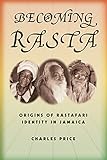Becoming Rasta : Origins of Rastafari Identity in Jamaica / Charles Price.
Material type: TextPublisher: New York, NY : New York University Press, [2009]Copyright date: ©2009Description: 1 online resourceContent type:
TextPublisher: New York, NY : New York University Press, [2009]Copyright date: ©2009Description: 1 online resourceContent type: - 9780814767467
- 9780814768464
- 299.676097292 23
- BL2532.R37 P75 2016
- online - DeGruyter
| Item type | Current library | Call number | URL | Status | Notes | Barcode | |
|---|---|---|---|---|---|---|---|
 eBook
eBook
|
Biblioteca "Angelicum" Pont. Univ. S.Tommaso d'Aquino Nuvola online | online - DeGruyter (Browse shelf(Opens below)) | Online access | Not for loan (Accesso limitato) | Accesso per gli utenti autorizzati / Access for authorized users | (dgr)9780814768464 |
restricted access online access with authorization star
http://purl.org/coar/access_right/c_16ec
So much has been written about the Rastafari, yet we know so little about why and how people join the Rastafari movement. Although popular understandings evoke images of dreadlocks, reggae, and marijuana, Rastafarians were persecuted in their country, becoming a people seeking social justice. Yet new adherents continued to convert to Rastafari despite facing adverse reactions from their fellow citizens and from their British rulers.Charles Price draws on in-depth interviews to reveal the personal experiences of those who adopted the religion in the 1950s to 1970s, one generation past the movement's emergence . By talking with these Rastafari elders, he seeks to understand why and how Jamaicans became Rastafari in spite of rampant discrimination, and what sustains them in their faith and identity.Utilizing new conceptual frameworks, Price explores the identity development of Rastafari, demonstrating how shifts in the movement's identity-from social pariah to exemplar of Blackness-have led some of the elder Rastafari to adopt, embrace, and internalize Rastafari and blackness as central to their concept of self.
Mode of access: Internet via World Wide Web.
In English.
Description based on online resource; title from PDF title page (publisher's Web site, viewed 01. Nov 2023)


